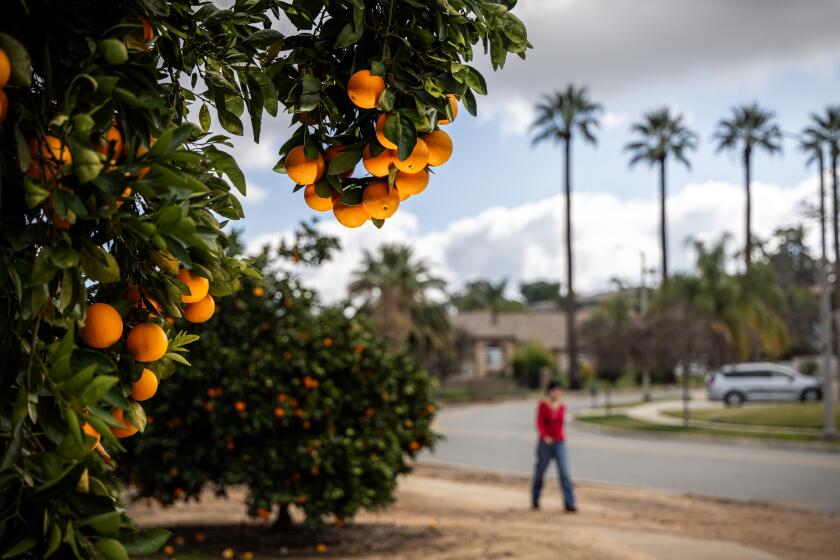Volunteers Pitch In on Farms and Watch Themselves Grow
In a 57-acre valley, where the traffic consists mostly of deer and rattlesnakes, 19-year-old Christophe Devlies and the four other unpaid farm workers take a break. Their morning began at 5 a.m. with yoga or meditation; now, the fields of organic eggplant and other crops can wait.
Lanky, with a blond ponytail, Devlies ducks into the four-bedroom farmhouse to escape the heat in the foothills of the Angeles National Forest. He shrugs off the calluses that line his palms, testimony to two weeks of field work and other duties at Ananda Marga Lake Hughes Peach Farm. His bare feet are dirty, his legs are cut up, his wallet is empty--and his summer vacation is turning out to be just grand.
“I’m working in the house and the field, but the house and the field are working on me,” said Devlies, who flew in from Belgium for a one-month volunteer stint at the nonprofit farm and yoga-meditation retreat. “All the things they give me back are more important than money because you help humanity, and also you develop yourself .... It’s a really good place because it’s basic, but that’s the only thing we need.” Later this month, he will return home to finish his high school equivalency exams.
Dozens of organic farms throughout California--and throughout the country--rely on volunteers such as Devlies who sometimes travel thousands of miles to help out during the summer harvest or beyond. In exchange, volunteers usually receive meals and housing, which could be a yurt, tent or bedroom in a farmhouse, and occasionally, a small stipend.
Typically, the number of California listings on www.organicvolunteers.com is higher than that of any of the other 40 states that are represented, said Ethan Schaffer, who created the Web site in June 2001. (California ranks second, after Idaho, in the number of acres--96,851--dedicated to certified organic cropland, according to the U.S. Department of Agriculture.) The site has 2,000 registered users, though Schaffer doesn’t track how many of them actually end up on farms. (Paid farm jobs also are listed).
The growing consumer interest in organic foods has led to a curiosity about such harvests, Schaffer said. And in late October, Schaffer anticipates another surge of interest, when the USDA’s National Organic Program takes effect. The program sets standards for products labeled “organic.”
A majority of the volunteers are recent high school graduates or college students. And what pulls them toward organic farms seems to be the same sense of commitment and idealism that energized college campuses in the ‘60s--but with a key difference, said UC Berkeley professor Arthur I. Blaustein, author of “Make a Difference: Your Guide to Volunteering and Community Service” (Heyday, 2002).
“It’s comparable in a moral sense but not in a political sense,” he said. “It’s comparable in terms of the pervasiveness of it, but it doesn’t involve confrontational activities.”
In the early ‘60s, when civil rights issues dominated the news, Blaustein volunteered for CORE, the Congress of Racial Equity, and signed up to work with migrant laborers in the potato and corn fields of Long Island. These days, he pointed out, a driving concern is the environment, as well as a sense of anti-materialism--both of which could explain the growing number of young farm volunteers.
Schaffer, who doesn’t screen the farms he lists on his site, said he leaves it up to volunteers to investigate the postings before agreeing to pay their own travel expenses and work for free--an arrangement, he acknowledged, that could raise questions. “People wonder what they’re getting into, so we really encourage them to get a good dialogue going beforehand,” he said.
He helps that process along by including a space for volunteer reviews. A volunteer’s posting about the Ananda Marga peach farm, for instance, noted: “Though you’re free to participate or not participate in their spiritual practices, there is an expectation that you’ll join in the thrice-daily mantra chantings and meditation sessions .... The workdays are definitely long, though rarely backbreaking. All in all, I’ve very much enjoyed my time there....”
Some volunteers are looking for ways to become involved in community service and travel. Others want to learn how to run their own organic farms. Professionals also take on two-week or longer positions, saying they need a break from full-time jobs--or life in the big city.
Even the farm’s customers ask if they can come out for a day or weekend to work, said Chelsea Jacobo, whose husband co-owns Winter Creek Gardens. The family-run farm is 90 miles northeast of the Bay Area in Capay Valley, bordering a creek that draws blue herons, bald eagles and rabbits.
“We have so much interest, mostly via e-mail, tons of people from all over the world and the country ... willing to do anything to spend time on the farm, offering to work for no pay,” Jacobo said. “A lot of people ... have a fantasy about farming and how wonderful it would be to live off the land ... and then they come and some realize, oh, gosh, this is really, really hard work.”
Jacobo has noticed that agricultural issues in the news can pique interest in farm work, as can something as simple as a visit to the local farmers’ market. “They want to see, where did [the food] come from? Who grew it?” she said. “There has been so much discussion on GMOs [genetically modified organisms] and pesticides and how clean is your food.... There’s a wanting to connect to something that maybe is bigger, maybe is smaller, than you. A wanting to connect and be part of a community.”
In an e-mail to Winter Creek Gardens, a 34-acre organic fruit and vegetable farm, one prospective volunteer recently wrote: “I’m 30 this year, and have been going through a lot of barriers to keeping or maintaining a mask of who I am. I started out by quitting my job and am now living less stressfully as a freelance writer, marketing consultant and trainer. I looked out and read about people out there like you, working toward a world without poison and greed. My heart is filled.... Life had meaning again.”
Part of the draw for volunteers at StarBrite Farm is its location in Humboldt County, on the banks of the Trinity River, owner Dezh Pagen said. “Humboldt has a reputation of sorts, a counterculture place behind the redwood curtain,” he said with a laugh. Volunteers stay in tents overlooking the river from which they can watch osprey diving for salmon.
None of the volunteers, most of whom are in their 20s, has been a problem, except for one who ran up his phone bill, Pagen said. In fact, without volunteers, he would be hard-pressed to keep his farm alive. “It’s hard finding people to work,” Pagen said. “There’s not a ready pull of labor here. This is a tiny farm community.”
Pagen runs the business with only three part-time paid workers to help him pick and pack fruits and vegetables, transplant seedlings from the greenhouse to the field and sell tomatoes, cucumbers, Asian pears and other produce at farmers’ markets. On busy days, volunteers spend 12 to 14 hours in the field, and, on slow days, Pagen gives them time off for canoeing, kayaking or taking advantage of the private swimming holes. He expects them to put in 40-hour workweeks.
Sixty miles northwest of Los Angeles, at the 57-acre farm run by Ananda Marga--a global social services and spiritual organization--none of the workers or administrators is paid. The farm, which has been run by Ananda Marga since 1993, sells its fruits and vegetables to major wholesalers and grocery stores such as Wild Oats and Whole Foods. But the main goal isn’t to rake in profits, said Allen Thurm, who helps manage the operations and coordinate volunteers from Southern California and elsewhere. Rather, the intention is to provide a “spiritual environment that combines farming with yoga and meditation ... and build a self-sustaining community.”
Field hands put together their meals from the day’s harvest. On Sunday, the volunteers set up a table in downtown Los Angeles from which they serve okra, eggplant and other cooked farm vegetables to the homeless. The farm’s assistant director, Dadaji Gananathananda, is an Ananda Marga yogic monk who oversees the workers.
Each year, the farm accepts about 20 to 30 volunteers for stints of up to 18 months, said Thurm, a special education teacher for the Los Angeles Unified School District. Most stay for two to three weeks, typically during the summer, though the farm has a need for volunteers year-round, he said.
The volunteers are screened through applications and phone interviews. Only one has been a problem--a college student who, after a night of drinking, totaled the farm’s van. (Alcohol is not allowed on the farm.) Over the years, the volunteers have included families, teachers and public relations experts.
Devlies, who lives with his parents, worked odd jobs to help cover his travel expenses to California. (His father, an accountant, paid his air fare.)
After his volunteer stint, he will take some time off for travel throughout the state to places such as Yosemite National Park.
Volunteer Erik Prochazka, 25, had worked as a driver in the Czech Republic’s army and as a caregiver to an elderly man in England before arriving at the farm six months ago. He had planned to stay two weeks.
“At first, it was strictly spiritual,” he said. “I really just wanted some kind of quiet place where I had some time to myself. Actually, when I would think of farming or gardening, I hated it. Then I came here. I saw people happy doing the things that they do, and I was, ‘What’s that?’ I tried, and I think I fell in love with the earth. And just realizing for the first time, it’s a miracle, you know--you just put something in [the ground], and it grows....
“I’m actually thinking about staying for a long, long time.”



